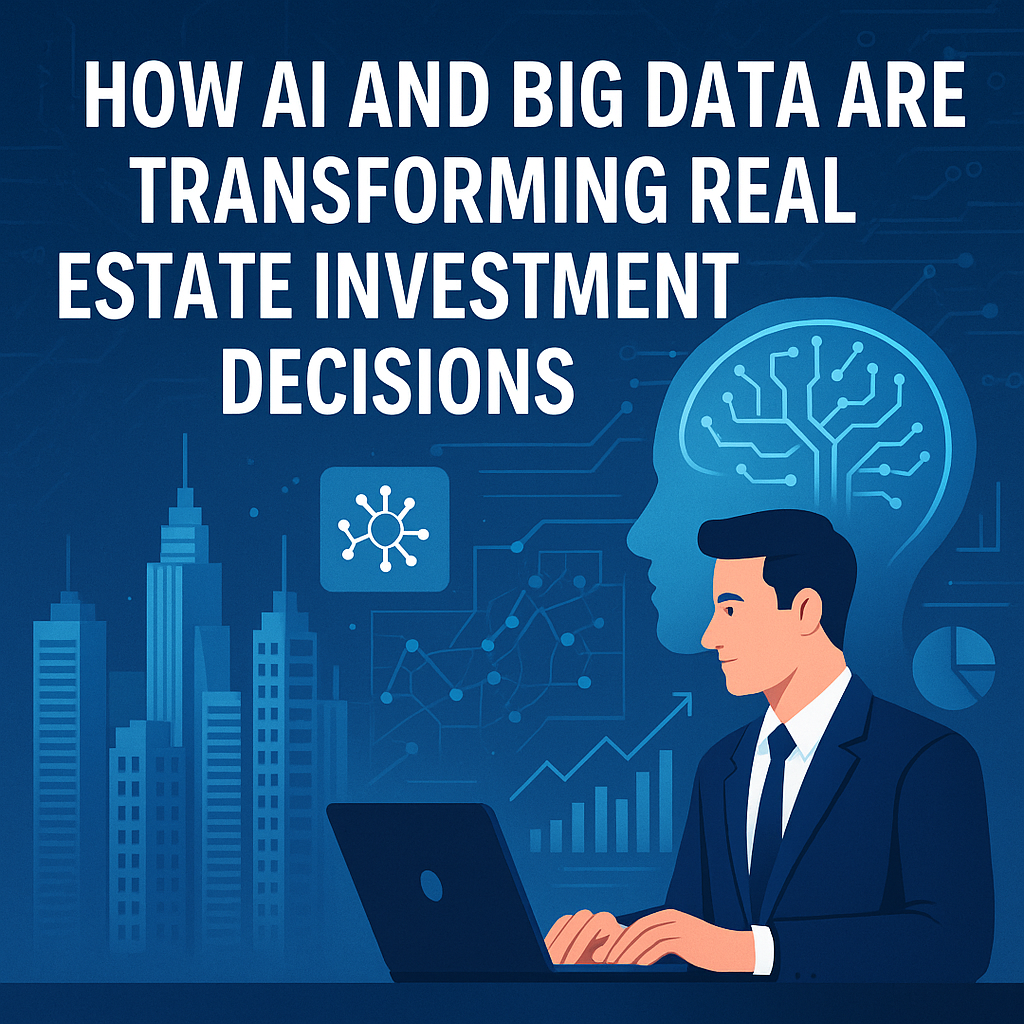
How AI and Big Data Are Transforming Real Estate Investment Decisions
In cities like Dubai, where the real estate market is highly dynamic and globally competitive, AI and big data are becoming essential tools. These technologies are providing stakeholders—from investors to real estate agents—with the ability to understand demand patterns, anticipate price fluctuations, and target potential buyers or renters more accurately than ever before.
AI-powered platforms can now assess thousands of variables simultaneously, from macroeconomic indicators and population growth to weather patterns and construction timelines. Meanwhile, big data aggregates information from countless sources: property records, satellite images, social media sentiment, and even smart home sensors. Together, they offer a 360-degree view of the market that’s continuously updating in real time.
Let’s break down how exactly AI and big data are revolutionizing real estate investment.
Enhanced Market Forecasting and Risk Assessment
One of the biggest challenges in real estate investment is forecasting market movements. Traditional methods, which rely heavily on past performance and limited economic indicators, often fail to capture the complexity of today’s interconnected global economy. AI algorithms, however, excel at identifying hidden patterns and making sense of massive data sets—making them ideal for forecasting.
For example, predictive analytics models can analyze years of property transactions, rental yields, demographic changes, infrastructure development, and even consumer behavior data to forecast future property values. These models can also simulate multiple market scenarios, giving investors a comprehensive view of potential risks and returns.
In Dubai, this is particularly valuable due to the rapid pace of development and the diversity of investor profiles. AI tools can forecast not just price appreciation but also rental demand in specific neighborhoods, upcoming trends in commercial real estate, and the impact of new government policies on market dynamics. For instance, changes in visa regulations or Expo 2020 legacies may influence residential demand—and AI models are often the first to detect these ripple effects.
Big data also supports smarter risk management. By aggregating and analyzing data from sources such as social media, property portals, government records, and satellite imagery, investors can gain early warnings about market volatility, oversupply issues, or upcoming infrastructural bottlenecks. This helps prevent poor investment decisions and ensures capital is allocated to high-potential assets.
In addition, AI can assess individual property risk with unprecedented granularity. It can evaluate structural integrity based on historical maintenance data, forecast insurance costs based on climate models, and even suggest the best use of a property—whether as a rental, commercial unit, or redevelopment opportunity. The days of “gut feeling” investments are fading; today’s decisions are increasingly data-backed and AI-refined.
Smarter Targeting and Personalization in Investment Opportunities
Another area where AI and big data are proving transformative is in the way real estate investment opportunities are sourced, marketed, and personalized for different investors. Whether you’re an institutional fund or a first-time buyer, AI can now tailor investment recommendations to your specific goals, risk tolerance, and geographic preferences.
Machine learning algorithms can analyze an investor's past decisions, current portfolio, and financial goals to suggest high-yield opportunities that align with their strategy. These systems constantly learn and evolve—improving with each interaction and market data update. For example, if you’ve shown interest in rental properties in Marina Dubai, the AI system may begin to prioritize similar listings with strong rental demand and low vacancy rates, based on live data.
Big data also plays a critical role in investor profiling. By examining online behavior, social media engagement, professional networks, and even psychographics, platforms can build robust investor profiles that go far beyond credit scores or income brackets. This means developers and brokers can more effectively match the right properties with the right buyers or investors—shortening the sales cycle and improving conversion rates.
On the consumer-facing side, real estate portals are also evolving. Instead of showing generic listings, AI-powered platforms now curate highly personalized suggestions. They factor in not just price and location, but lifestyle preferences, commuting patterns, school zones, and neighborhood amenities. This level of personalization leads to more satisfied buyers, quicker decisions, and stronger long-term investment relationships.
In Dubai’s luxury and off-plan property segments, this is particularly impactful. AI tools can identify high-net-worth individuals likely to invest in waterfront villas or branded residences based on travel patterns, purchase behavior, or recent online searches. Developers can then directly target these leads with tailored marketing campaigns—resulting in better ROI and reduced advertising waste.
Furthermore, real estate tokenization—powered by blockchain and guided by AI—is making property investment more accessible. AI systems can help determine the most lucrative assets to tokenize, while big data helps assess investor demand. This convergence is opening the door to fractional ownership and democratized investing, bringing new players into the market.






Leave a Reply
Comments
muzhskie kostyumy spb 56 ()
бренды мужских костюмов мужской костюм купить магазин
derevyannye lyustry 11 ()
люстры в интерьере сделать деревянную люстру
MichaelPlunk ()
Play online puzzles https://readymother.ru/forum/topic/razvivajte-vnimatelnost/#postid-261 anytime and train your logic and attention skills. Classic and themed puzzles, various sizes, simple gameplay, and comfortable play on computers and mobile devices.
Jeromenaw ()
сколько стоит квартира жк светский лес сочи купить квартиру
IrvingIrrax ()
химчистка и реставрация обуви химчистка обуви
up-x 58 ()
Любишь азарт? up x официальный сайт играть онлайн легко и удобно. Быстрый доступ к аккаунту, понятная навигация, корректная работа на любых устройствах и комфортный формат для пользователей.
up-x 82 ()
Играешь в казино? t.me простой вход, удобная регистрация и доступ ко всем возможностям платформы. Стабильная работа, адаптация под разные устройства и комфортный пользовательский опыт.
up x 75 ()
Любишь азарт? ап икс скачать играть онлайн в популярные игры и режимы. Быстрый вход, удобная регистрация, стабильная работа платформы, понятный интерфейс и комфортные условия для игры в любое время на компьютере и мобильных устройствах.
Larrydiady ()
АрсМед: https://arsmedclinic.ru Многопрофильная клиника, предлагающая широкий выбор медицинских услуг от диагностики до лечения. Современный подход и комфортные условия для пациентов всех возрастов.
Michealdag ()
проектор изображения интернет-магазин проекторов в Москве
Charlesnum ()
Полесская ЦРБ: https://polesskcrb.ru Официальный портал центральной районной больницы Калининградской области. Информация об услугах, расписание врачей и важные новости здравоохранения для жителей региона.
GerardoFal ()
Детский Доктор: https://kidsmedic.ru Специализированный медицинский центр для детей. Квалифицированная помощь педиатров и узких специалистов для здоровья вашего ребенка с первых дней жизни.
EduardoJax ()
Рэмси Диагностика: https://remsi-med.ru Сеть высокотехнологичных диагностических центров (МРТ, КТ). Точные исследования на оборудовании экспертного класса и качественная расшифровка снимков.
Jeffreyquemi ()
Специализированный коррекционно-речевой https://neyroangel.ru детский сад для детей с особенностями развития в Москве. Беремся за самые тяжелые случаи, от которых отказываются другие. Нейропсихолог, логопед, запуск речи. Государственная лицензия: Л035-01298-77/01604531 от 09.12.24
med-spravki-msk 58 ()
Сделать водительскую медицинскую справку https://med-spravki-msk.ru
modulndom ()
Модульные дома https://modulndom.ru под ключ: быстрый монтаж, продуманные планировки и высокое качество сборки. Подходят для круглогодичного проживания, отличаются энергоэффективностью, надежностью и возможностью расширения.
RubinElach ()
химчистка обуви кроссовки химчистка обуви
zhk svetskii les sochi 78 ()
квартира в сочи купить жк светский лес
Jamespax ()
Celebrity World Care https://celebrityworldcare.com интернет-магазин профессиональной медицинской и натуральной косметики для ухода за кожей при ихтиозе, дерматитах, псориазе и других дерматологических состояниях. Сертифицированные средства с мочевиной, без отдушек и парабенов. Доставка по России.
Carrollkek ()
Проблемы с авто? ремонт электрики шкода спб диагностика, ремонт электрооборудования, блоков управления, освещения и систем запуска. Опыт, современное оборудование и точное определение неисправностей.
WileyBat ()
Philly roofing? Philadelphia roof repair new roof installation, leak repair, restoration, and maintenance of roofing systems. Experienced specialists, modern technologies, reliable materials, and a personalized approach to each project.
Philipators ()
Нужен проектор? магазин проекторов большой выбор моделей для дома, офиса и бизнеса. Проекторы для кино, презентаций и обучения, официальная гарантия, консультации специалистов, гарантия качества и удобные условия покупки.
Anya153pn ()
Hello folks!
I came across a 153 awesome site that I think you should visit.
This site is packed with a lot of useful information that you might find interesting.
It has everything you could possibly need, so be sure to give it a visit!
https://modsdiary.com/instructions-on-how-to-play-and-basic-football-betting-experience/
Additionally remember not to neglect, guys, that a person always may in this publication find solutions to address the most the absolute confusing queries. Our team tried — explain the complete content via the most understandable method.
Philipators ()
Нужен проектор? https://projector24.ru большой выбор моделей для дома, офиса и бизнеса. Проекторы для кино, презентаций и обучения, официальная гарантия, консультации специалистов, гарантия качества и удобные условия покупки.
PhillipHip ()
Читать расширенную версию: https://dzen.ru/a/aVz2_ga-OSe4JYcW
PhillipHip ()
Нужен памятник? купить памятник в уфе — гранитные и мраморные изделия. Индивидуальные проекты, точная обработка камня, оформление и монтаж. Надёжное качество и внимательное отношение к деталям.
BrianDeR ()
дизайн квартир студий 25 фото студия дизайна интерьера
Brandonzew ()
Нужно авто? владивосток покупка авто из японии поиск, проверка, оформление и доставка авто из разных стран. Прозрачные условия, помощь на всех этапах и сопровождение сделки до получения автомобиля.
KennethAmicT ()
Нужен памятник? памятник уфа — гранитные и мраморные изделия. Индивидуальные проекты, точная обработка камня, оформление и монтаж. Надёжное качество и внимательное отношение к деталям.
Philipoffex ()
Нужен памятник? заказать памятник в уфе — гранитные и мраморные изделия. Индивидуальные проекты, точная обработка камня, оформление и монтаж. Надёжное качество и внимательное отношение к деталям.
Williamlendy ()
Оборудование для отопления https://thermostock.ru и водоснабжения: котлы, циркуляционные насосы, радиаторы, мембранные баки и комплектующие от ведущих производителей. Что вы получаете: сертифицированные товары, прозрачные цены, оперативную обработку заказа. Создайте комфортный микроклимат в доме — выбирайте профессионалов!
MarvinEdugs ()
Производим торговую мебель https://woodmarket-for-business.ru для розничного бизнеса и сетевых магазинов. Функциональные конструкции, современный дизайн, точные размеры и полный цикл работ — от проекта до готового решения.
blin-na-shtangy 509 ()
Ищешь блины для штанки? блины для штанги из металла для эффективных силовых тренировок. Чугунные и резиновые диски, разные веса, долговечность и удобство использования. Решение для новичков и опытных спортсменов.
Herbertlus ()
Grasz w kasynie? Kasyno internetowe w Polsce to najlepsze miejsca do gry w latach 2025–2026. Zaufane strony, sloty i gry na zywo, przejrzyste warunki, wygodne wplaty i wyplaty.
WhitneyOript ()
Szukasz kasyna? kasyno pl w Polsce: wybor najlepszych stron do gry. Licencjonowane platformy, popularne sloty i kasyna na zywo, wygodne metody platnosci, uczciwe warunki i aktualne oferty.
Matthewunini ()
Торговая мебель https://woodmarket-for-business.ru от производителя для бизнеса. Витрины, стеллажи, островные конструкции и кассовые модули. Индивидуальный подход, надёжные материалы и практичные решения для продаж.
JamesSlall ()
Производство оборудования https://repaircom.ru с предварительной разработкой и адаптацией под требования клиента. Качественные материалы, точные расчёты, соблюдение сроков и техническая поддержка.
Edwardned ()
Жалюзи от производителя https://balkon-pavilion.ru изготовление, продажа и профессиональная установка. Большой выбор дизайнов, точные размеры, надёжная фурнитура и комфортный сервис для квартир и офисов.
MelvinRip ()
Изделия из пластмасс https://ftk-plastik.ru собственного производства. Продажа оптом и в розницу, широкий ассортимент, надёжные материалы и стабильные сроки. Выполняем заказы любой сложности по техническому заданию клиента.
Robertacuch ()
Производим пластиковые https://zavod-dimax.ru окна и выполняем профессиональную установку. Качественные материалы, точные размеры, быстрый монтаж и гарантийное обслуживание для комфорта и уюта в помещении.
Edwardbam ()
купить квартиру в жк жк светский лес сочи
Terryvop ()
джойказино рабочее зеркало джойказино вход
Stevefrife ()
Op zoek naar een casino? WinItt Casino biedt online gokkasten en live games. Het biedt snel inloggen, eenvoudige navigatie, moderne speloplossingen en stabiele prestaties op zowel computers als mobiele apparaten.
organicgrunt 462 ()
Поставляем грунт https://organicgrunt.ru торф и чернозем с доставкой по Москве и Московской области. Подходит для посадок, благоустройства и озеленения. Качественные смеси, оперативная логистика и удобные условия для частных и коммерческих клиентов.
Jesuskayab ()
риобет бонус https://riobetcasino-money.ru
1win-apk-773 ()
compte 1win 1win apk
DwightZep ()
Городской портал https://u-misti.cherkasy.ua Черкасс — свежие новости, события, происшествия, экономика и общественная жизнь. Актуальные обзоры, городская хроника и полезная информация для жителей и гостей города.
Larrymic ()
Новости Днепра https://u-misti.dp.ua сегодня — актуальные события города, происшествия, экономика, политика и общественная жизнь. Оперативные обновления, важные решения властей и главные темы дня для жителей и гостей города.
Jamesaboni ()
Актуальные новости https://u-misti.chernivtsi.ua Черновцов на сегодня. Экономика, происшествия, культура, инфраструктура и социальные вопросы. Надёжные источники, регулярные обновления и важная информация для жителей города.
Jefferyerupe ()
Винница онлайн https://u-misti.vinnica.ua последние новости и городская хроника. Главные события, заявления официальных лиц, общественные темы и изменения в жизни города в удобном формате.
Rubenrok ()
Новости Киева https://u-misti.kyiv.ua сегодня — актуальные события столицы, происшествия, политика, экономика и общественная жизнь. Оперативные обновления, важные решения властей и ключевые темы дня для жителей и гостей города.
BillyDiori ()
Львов онлайн https://u-misti.lviv.ua последние новости и городская хроника. Важные события, заявления официальных лиц, общественные темы и изменения в жизни одного из крупнейших городов Украины.
EdgarWed ()
Новости Хмельницкого https://u-misti.khmelnytskyi.ua сегодня на одном портале. Главные события города, решения властей, происшествия, социальная повестка и городская хроника. Быстро, понятно и по делу.
melbet 735 ()
connexion officielle melbet melbet telecharger
Jamessmuby ()
Новости Житомира https://u-misti.zhitomir.ua сегодня: городские события, инфраструктура, транспорт, культура и социальная сфера. Оперативные обновления, обзоры и важная информация о жизни Житомира онлайн.
Craigjeopy ()
Портал города https://u-misti.odesa.ua Одесса с новостями, событиями и обзорами. Всё о жизни города: решения властей, происшествия, экономика, спорт, культура и развитие региона.
Manuelces ()
Полтава онлайн https://u-misti.poltava.ua городской портал с актуальными новостями и событиями. Главные темы дня, общественная жизнь, городские изменения и полезная информация для горожан.
MathewMib ()
Блог для мужчин https://u-kuma.com с полезными статьями и советами. Финансы, работа, здоровье, отношения и личная эффективность. Контент для тех, кто хочет разбираться в важных вещах и принимать взвешенные решения.
GeraldTrums ()
Портал для пенсионеров https://pensioneram.in.ua Украины с полезными советами и актуальной информацией. Социальные выплаты, пенсии, льготы, здоровье, экономика и разъяснения сложных вопросов простым языком.
JamesPah ()
Объясняем сложные https://notatky.net.ua темы просто и понятно. Коротко, наглядно и по делу. Материалы для тех, кто хочет быстро разобраться в вопросах без профессионального жаргона и сложных определений.
Carlosglike ()
познавательный блог https://zefirka.net.ua с интересными статьями о приметах, значении имен, толковании снов, традициях, праздниках, советах на каждый день.
MichaelDaymn ()
Новости Киева https://infosite.kyiv.ua события города, происшествия, экономика и общество. Актуальные обзоры, аналитика и оперативные материалы о том, что происходит в столице Украины сегодня.
BrianVap ()
Автомобильный портал https://avtogid.in.ua с актуальной информацией об автомобилях. Новинки рынка, обзоры, тест-драйвы, характеристики, цены и практические рекомендации для ежедневного использования авто.
ElvinBew ()
Днепр онлайн https://faine-misto.dp.ua городской портал с актуальными новостями и событиями. Главные темы дня, общественная жизнь, городские изменения и полезная информация для горожан.
Richarddioms ()
Портал города Хмельницкий https://faine-misto.km.ua с новостями, событиями и обзорами. Всё о жизни города: решения местных властей, происшествия, экономика, культура и развитие региона.
Robertsiz ()
Новости Львова https://faine-misto.lviv.ua сегодня: городские события, инфраструктура, транспорт, культура и социальная повестка. Обзоры, аналитика и оперативные обновления о жизни города онлайн.
Gerardoameld ()
Новости Житомира https://faine-misto.zt.ua сегодня: события города, инфраструктура, транспорт, культура и социальная сфера. Обзоры, аналитика и оперативные обновления о жизни Житомира онлайн.
JacobSam ()
Сайт города Винница https://faine-misto.vinnica.ua свежие новости, городские события, происшествия, экономика, культура и общественная жизнь. Актуальные обзоры, важная информация для жителей и гостей города.
BrianSop ()
Сайт города Одесса https://faine-misto.od.ua свежие новости, городские события, происшествия, культура, экономика и общественная жизнь. Актуальные обзоры, важная информация для жителей и гостей Одессы в удобном формате.
rafa-silva 203 ()
Rafa Silva https://rafa-silva.com.az is an attacking midfielder known for his dribbling, mobility, and ability to create chances. Learn more about his biography, club career, achievements, playing style, and key stats.
ufc-baku 309 ()
UFC Baku fan site ufc baku for fans of mixed martial arts. Tournament news, fighters, fight results, event announcements, analysis and everything related to the development of UFC in Baku and Azerbaijan.
barcelona 650 ()
Barcelona fan site https://barcelona.com.az with the latest news, match results, squads and statistics. Club history, trophies, transfers and resources for loyal fans of Catalan football.
galatasaray 81 ()
Galatasaray Football Club https://galatasaray.com.az/ latest news, fixtures, results, squad and player statistics. Club history, achievements, transfers and relevant information for fans.
email rassylka 526 ()
сервис рассылок smtp email сервис рассылки
Timothydop ()
the best adult generator check link create erotic videos, images, and virtual characters. flexible settings, high quality, instant results, and easy operation right in your browser. the best features for porn generation.
TerryCrike ()
Need an AI generator? https://undress-ai.app The best nude generator with precision and control. Enter a description and get results. Create nude images in just a few clicks.
zfilm-hd 333 ()
сериал языке смотреть онлайн подряд смотреть онлайн
Timothytal ()
пицца куба рязань доставка заказать пиццу в рязани
Antonytoilm ()
пиццерия сайт доставки пиццы
.zahnarzte montenegro 36 ()
Zahnprobleme? zahnarzte in bar montenegro Diagnostik, Kariesbehandlung, Implantate, Zahnaufhellung und Prophylaxe. Wir bieten Ihnen einen angenehmen Termin, sichere Materialien, moderne Technologie und kummern uns um die Gesundheit Ihres Lachelns.
zfilm hd 273 ()
смотреть онлайн прямой фильмы про космос научная фантастика
zadvizhka 30s41nzh 110 ()
задвижки 30с41нж мзта https://zadvizhka-30s41nzh.ru
email rassylka 302 ()
сервис почтовых рассылок https://email-rassylka.ru
terea-iluma-458 ()
IQOS ILUMA https://terea-iluma24.org и стики TEREA — покупка в Москве без риска. Гарантия подлинности, большой выбор, выгодные условия, доставка по городу и помощь в подборе устройства и стиков.
ekb-terea-123 ()
Продажа IQOS ILUMA https://ekb-terea.org и стиков TEREA в СПб. Только оригинальные устройства и стики, широкий ассортимент, оперативная доставка, самовывоз и поддержка клиентов на всех этапах покупки.
spb-terea 33 ()
Купить IQOS ILUMA https://spb-terea.store и стики TEREA в Санкт-Петербурге с гарантией оригинальности. В наличии все модели ILUMA, широкий выбор вкусов TEREA, быстрая доставка по СПб, удобная оплата и консультации специалистов.
RaymondAssow ()
Do you love gambling? jwin7 Online is safe and convenient. We offer a wide selection of games, modern slots, a live casino, fast deposits and withdrawals, clear terms, and a stable website.
HermanAbula ()
Playing at the casino? jwin7 casino Play online for real money. We offer a wide selection of slots, live dealers, fast payments, easy login, and exciting offers for new and returning players.
ForestDiz ()
Looking for a casino? 8mbets Slots, table games, and live casino all in one place. Quick login, convenient registration, modern providers, stable payouts, and comfortable player conditions.
1xbet apk 628 ()
Application web 1xbet telecharger 1xbet apk
undress ai ()
Need an AI generator? ai tool to remove clothes The best nude generator with precision and control. Enter a description and get results. Create nude images in just a few clicks.
1xbet apk 201 ()
Site web mobile 1xbet telecharger 1xbet pour android
IT Telkom ()
How does this topic impact your daily life or society in general?, Visit us IT Telkom